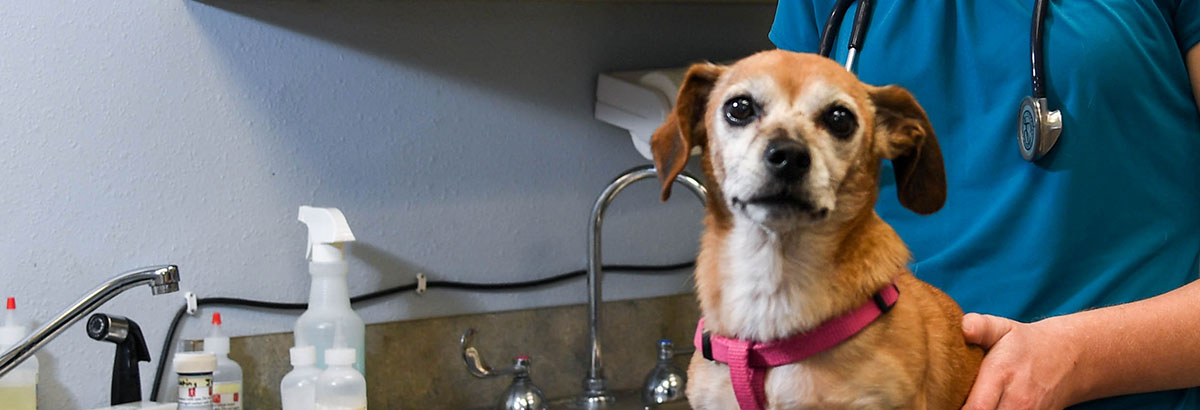There are no drugs that specifically treat pancreatitis in dogs. Therapy involves a combination of controlling the infection and inflammation and providing symptomatic care.
In case of pancreatitis, the treatment involves the followings:
- Antibiotics: Infection is commonly a component of pancreatitis. Despite the fact that antibiotics can sometimes cause GI upset, short-term use is recommended for acute pancreatitis.
- Nonsteroidal anti-inflammatory drugs (NSAIDs): Much like antibiotics, NSAIDs can cause GI upset. However, their value in reducing pancreatic inflammation often outweighs this concern.
- Pain control: Opiates like buprenorphine or sometimes a slow-release patch of fentanyl can be used for dogs with severe pain.
In case of EPI, the treatment is made up of:
- Pancreatic enzyme replacement: The primary therapy for EPI is the addition of enzymes to your pet’s food to replace what their own pancreas is not producing. There are two types of digestive enzyme supplements available: porcine and fungal.
Dogs with EPI need the supplements made from desiccated porcine (pig) pancreas. You can mix the powdered enzyme supplement with their food. Positive effects are very quickly evident; stools become more normal within days of starting.
Fungal-derived enzymes can be effective for pets with mild digestive issues, gas, and sometimes IBD. However, they are not sufficient to treat EPI. - Antibiotics: Dogs with TLI will sometimes have an overgrowth of intestinal bacteria due to all the undigested food in their GI tract. Antibiotic therapy with drugs like metronidazole or tylosin is sometimes recommended by the veterinarian.
- Vitamin B12 (cobalamin) and folate supplementation: Dogs with bacterial overgrowth within the small intestine often concurrently have B vitamin deficiencies. This overgrowth of bacteria can lead to a deficiency of vitamin B12 (in cats and dogs) and folate (in cats), so supplementation is necessary. Initially, your veterinarian may give B12 or folate supplementation via injection, and then switch to oral administration later.
Using Diet for Pancreatitis and EPI
- Acute pancreatitis: Many pets with pancreatitis will not eat or will vomit if they do. Once they get to a point where they can eat, a bland diet is often recommended. A prescription bland diet or a mixture of boiled chicken and rice is the most frequently recommended. Either is fine in the short term, although home-prepared is always superior.
- Chronic pancreatitis: Dogs with chronic pancreatitis often are very sensitive to high-fat diets. Conventional medicine generally recommends a prescription bland diet.
- EPI: Depending on the severity of the EPI, a change in diet may or may not be recommended within the scope of conventional medicine. If it is, most likely the recommendation will be for an easily digestible prescription diet.
Complementary and Alternative Medical Therapy
 Acute pancreatitis requires acute medical care. This is the time for Western medical intervention. Without Western treatment, pets can become dangerously dehydrated, making their situation progressively worse.
Acute pancreatitis requires acute medical care. This is the time for Western medical intervention. Without Western treatment, pets can become dangerously dehydrated, making their situation progressively worse.
The following recommendations focus on managing chronic pancreatitis in dogs who are able to eat and keep food down. (Hyperbaric oxygen and cannabis, however, do offer relief for dogs with acute pancreatitis.)
In case of pancreatitis the therapy is made up of:
- Diet: Ideal diets for dogs with chronic pancreatitis are very low in fat, as these are easily digestible and do not require as much pancreatic activity.
- Hyperbaric oxygen therapy: The anti-inflammatory and antimicrobial effects of HBOT make it highly effective in the treatment of acute pancreatitis or flare-ups of chronic pancreatitis.
- Cannabis: Medical cannabis is first on the list of herbs for chronic GI conditions and pancreatitis because of the overwhelmingly positive results many patients experience. Cannabis can be used for both acute and chronic pancreatitis. Some pets do well with a hemp-based CBD product, although more severe conditions may require a product with a 1:1 THC-to-CBD ratio.
In case of EPI, the therapy constitutes in:
- Pancreatic enzyme replacement: Even from the holistic perspective, supplementation with porcine-derived digestive enzymes is the best plan. It is all-natural, directly addresses the condition (rather than treating symptoms), and has no side effects when used in recommended doses.
- Diet: Regardless of the level of success of enzyme supplementation, anything we can do to improve the nutritional profile of pets with EPI is going to be a plus. Remember, most of them are underweight and malnourished at the time of diagnosis. Feeding EPI pets a fresh, whole-food diet provides a highly digestible and nutritious meal that will ultimately provide the kind of nutrients their body needs with a relative minimum of digestive effort.
Caution: EPI pets are digestively challenged, and the goal is to feed the easiest foods to digest. Raw foods, however, require more energy to digest than cooked, and therefore may not be the first choice for dogs with EPI. If you are really determined to feed raw, start with cooked and slowly transition to a raw diet to see if your dog with EPI can handle it. - Vitamin supplementation: Given that EPI dogs may not be digesting their nutrients optimally, they often need vitamin/mineral supplementation. They may require long-term supplementation of folate and B12.
Nutritional Supplementation for Pancreatitis and EPI
- Probiotics: Probiotics, ,appeal the GI tract and overall immune system health. Optimizing both leads to better digestion, nutrient absorption, and decreased GI inflammation. Along with optimal nutrition, probiotics promote good intestinal flora and are a cornerstone of good health and immune system function.
- Clay powder: Bentonite clay and montmorillonite clay are great supplements for acute or chronic diarrhea. The clay binds to bacterial toxins and helps to normalize stool quality. Clay helps resolve conditions caused by bacterial imbalance with minimal side effects.
- Whole-food supplementation: The declining nutritional value of foods is well documented. Even a home-prepared, whole-food diet can be improved with additional nutrients. Companies such as Standard Process make supplements derived from all whole-food ingredients, and we particularly recommend adding their Canine Enteric Support, Pancreatrophin PMG, and/or Zypan to your dog’s
diet to support digestion and pancreatic function. To determine which products are best, talk to a practitioner who is familiar with using Standard Process supplements.
Caution: Do not give these supplements to dogs that are sensitive to beef, pork, or lamb. - Bovine colostrum: Derived from cow’s milk, colostrum is well documented to improve inflammation within the GI tract. In humans, it has been shown to improve the symptoms of inflammatory bowel disease and chronic colitis. It has even been shown to protect the GI tract against damage induced by NSAIDs.
Caution: Do not give colostrum to dogs that are sensitive to dairy proteins. - Fish oil: Fish oil provides essential fatty acids, supports normal GI and immune system function, and is a natural anti- inflammatory when used in appropriate doses. Despite its benefits, fish oil
should be used with caution in pets with pancreatitis or EPI, as fat digestion stimulates pancreatic function. Begin with very small doses, then increase the amount slowly.
Caution: While fish oil does not contain fish protein (only the fats), dogs with severe sensitivities to fish should avoid it. - Herbal therapy: In theory, many of the herbs recommended for IBD may be applicable for dogs with pancreatitis or EPI, although they may not be necessary. Be cautious, as the addition of anything has the potential to cause GI upset.
When it comes to pets with pancreatitis, sometimes less is more. The goal is to make the digestive process as easy as possible. View the supplement recommendations on the list as reference guide. If you or your do’s healthcare provider believes they are indicated, proceed slowly and with caution.
The intestines of EPI pets, unlike those of pets with IBD, are usually fine. The signs of GI upset frequently resolve once the primary treatment measures described above are under way.
Integrative Treatment Plan
For such a small organ, a malfunctioning exocrine pancreas sure can make a big mess. Successful therapy of either EPI or pancreatitis depends on accurate diagnosis and the right combination of therapies.
Consider the integrative treatment plans listed as suggestions. Every individual pet is going to be different and therapy will need to be adjusted accordingly.
Acute Pancreatitis
Managing pancreatitis can be a one- or a two-stage process. Many pets that develop acute pancreatitis will never progress to a chronic condition. For these pets, short-term care is all they need.
- Depending on your dog’s level of pain and ability to keep food down, they may need in-patient hospitalization and supportive care. IV fluids, antibiotics, and anti-inflammatory and pain medications will likely be necessary.
- The next step is outpatient supportive care, including subcutaneous fluids (under the skin), antibiotics, and anti-inflammatory/pain medication as frequently as necessary.
- Hyperbaric oxygen therapy is an excellent way to speed recovery from acute pancreatitis.
- Feed your dog a bland diet, at least in the short term. This can either be homemade or a prescription bland diet, to be fed for several days or weeks. Ideally, homemade is better.
- Consider medical cannabis for nausea, pain, and inflammation.
Chronic Pancreatitis
Dogs with chronic or recurring bouts of pancreatitis need long-term care to keep inflammation to a minimum. It is best, however, to start with a less-is-more approach with chronic pancreatitis.
- Long-term appropriate dietary therapy is a cornerstone of treating chronic pancreatitis.
- Probiotics and clay powder provide very gentle supplementation and excellent GI support.
- Cannabis can be used regularly or symptomatically for GI upset or discomfort.
- Be cautious in considering additional supplementation—you run the risk of upsetting the apple cart. If you or your pet’s health-care provider believes they are indicated, proceed slowly and with caution.
EPI
EPI is one of those conditions for which there is general agreement between conventional and alternative care.
The only disagreement may be in cases where long-term antibiotic use is recommended.
Instead of long-term antibiotics, a better approach is to change the environment in the GI tract to create a friendly space for beneficial bacteria and inhibit the proliferation of pathogenic (bad) bacteria.
The following is a good integrative approach to EPI.
- Immediately start your dog on porcine-based digestive enzyme supplementation.
- Switch to a fresh, whole-food diet that is designed to be easily digestible.
- Begin vitamin supplementation, especially B vitamins (folate and B12).
- If the lab work indicates bacterial overgrowth, start short-term antibiotic use.
- Add probiotics to your dog’s diet.
- If you feel it is necessary and your pet tolerates it well, add fish oil to their diet.
- If GI signs persist, consider whole-food supplementation and/or colostrum.
- If GI signs persist, consider herbal therapy for GI support.

